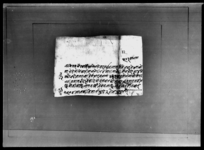A bond entered into by Bahidāra Harka Vīlāsa re a gambling debt owed to Bhairava Siṁ (VS 1904)
ID: K_00149_0009
Edited and
translated by Simon Cubelic
in collaboration with
Rajan Khatiwoda
Created: 2015-07-15;
Last modified: 2016-02-29
For the metadata of the document, click here
The accompanying edition, translation/synopsis and/or commentary are available under the terms of the Creative Commons Attribution-ShareAlike 4.0 International License
Abstract
In this bond Bahidāra Harka Vīlāsa declares that in the matter of a gambling debt incurred in VS 1903 to Bhairava Siṁ, he will submit an account and meet the merchant Topahari within four days. If he fails to do so, he accepts the previously declare sum of 432 Rs.Diplomatic edition
[1r]
⟪३३⟫सही[?]1लिषितम्भैरवसिंआगेवहिदारहर्कवीलासमैले⟪१९०३सालमा⟫जुवाषेल्याको2मा•येहिमीतिकाहीसावलेदीन४माहीसावदीतोपहरि•साहुसि
3तकोवदेजगरूलाःहेर्नआइनभन्या४३२साहुलेभन्याकोसदर
4भनीजमानवंदिलेषीदियाँयसवातकोसाछिजीतमानषत्रीस
5छिमोतीसाछिजोगनर्सिंलेषकसाछिसोहस्तेइतीसम्वत्
6१९०४सालमीतिमार्गशुदि२रोज५शुभम्¯¯¯¯¯¯
Translation
[1r]
33 Written to Bhairava Siṁ. Regarding the gambling (that took place) in the year 1903, I BahidāraHarka Vīlāsa will give an account within four days from this date (i.e. the date of this document) and make arrangements [for replayment] with the merchant Topahari. I have signed [below] a settlement agreement saying: "If I do not come to see [him] (i.e. to settle the issue), I accept the [amount of] 432 [Rs.] declared by the merchant." The witnesses to this matter are by [their own] hand: Jītamāna Khatrī, Motī, [and] the scriber [of this document] Joganarsiṁ. Thursday, the 2nd of the bright fortnight of Mārga in the year 1904. [signature]
Commentary
Although the context of this bond remains unclear, one might speculate that the reason for Bahidāra Harka Vīlāsa obliging himself to meet the merchant Topahari is to negotiate a price for selling off property in order to clear the gambling debts he owes to Bhairava Siṁ. The document reflects the more lenient stance towards gambling which characterized legislation on this subject after the reign of Pṛthvī Nārāyaṇa Śāha. Whereas Pṛthvī Nārāyaṇa Śāha banned gambling completely, Raṇa Bahādur Śāha legalized it during the Tīja and Tihāra festivals (cf. Acharya 1975: 167). However, the practice of placing bets on a loan basis, as intimated in this document of 1847, was prohibited by the Mulukī Ain of 1854. According to Article 75 Section 3, any gambling debts in the form of property not present at the gambling site are null and void. Similarly, Section 5 stipulates that loans advanced to gamblers are not valid and are even punishable.

